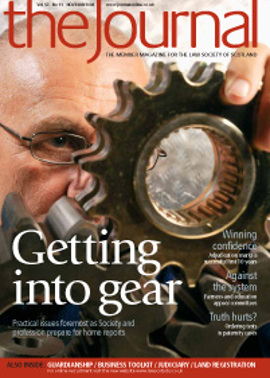Sourcing our future
Universities: a strategic priority
Lindsay Kelly explains the Pathways to the Professions scheme
Widening participation (WP) addresses the large discrepancies in the takeup of higher education opportunities between different social groups. WP in higher education is a strategic priority for the government, the higher education sector in general and the University of Edinburgh in particular.
We work to raise aspirations and educational attainment among people from under-represented communities to prepare them for higher education. Also key within this are: helping to ensure success on the programme of study; improving employment prospects; opening possibilities for postgraduate study; and giving opportunities to return to learning throughout their lives.
One of the ways in which this is carried out in terms of access to law is through the internationally recognised Pathways to the Professions scheme. Pathways to the Professions provides information and guidance to school students interested in studying law, medicine, veterinary medicine and (new for 2008) architecture. At the present time, the project is open to students from all 46 state schools in Edinburgh and the Lothians. The project was developed with the support of the Law Society of Scotland and the Faculty of Advocates.
The law strand of this project offers insights into the profession, namely through an annual career exploration day (So You Want to be a Lawyer), a twice-annual work observation programme (supported by over 40 firms and organisations), invitations to lectures and summer schools. We also work with the families of these students and invite them to attend parents’ information evenings. Since the project is called Pathways to the Professions, it is imperative that support does not stop once students begin their chosen course. The School of Law works very hard to ensure student support is a priority.
With the School of Law at Edinburgh having just celebrated its tercentenary, it can be challenging to ensure that the juxtaposition between the history of the school and its accessibility to future generations does not create barriers to potential applicants. One of the ways in which this is tackled is through the Law Peer Assisted Learning Scheme (LawPALS). Each first year undergraduate student is assigned to an upper level LLB student in a group which meets weekly throughout the first semester. LawPALS fosters cross-year support and is facilitation, as opposed to any kind of tutoring. To complement this, PALSPlus has been developed to provide more targeted and specific support, using an interactive workshop format with academics from the school and other experts. Both projects are open to all first year undergraduates, as research shows that opening these opportunities only to WP students means they are less likely to attend as they may feel stigmatised.
The first cohort of undergraduates who were admitted to Edinburgh’s School of Law via Pathways have just graduated and some are embarking on Diploma study. In light of the gloomy economic future, and scared whisperings about traineeships drying up, we are left to wonder what value will be placed on the Diploma in the future. We await with anticipation the final outcome of the Society’s review into legal education, and the changes and challenges it may bring.
Whilst an LLB degree equips one with analytical, logical and communication skills desired by many employers, the extra expense of the Diploma without guarantee of a traineeship may not withstand the financial pressure for some graduates. Finance is often more of a factor for students who come from WP backgrounds, and this has to have a knock-on effect in the future. The social diversity of the profession could be at stake and the potential of these graduates could be lost from the profession. Engagement of law firms within programmes such as Pathways to the Professions is vital to their success and, as a consequence, the success of these students.
Your call
If you are involved in careers or WP activities, email newlawyers@lawscot.org.uk .
Final policy proposals on legal education and training, The Way Forward, are available at www.lawscot.org.uk/training/ consult, for consultation until Friday 6 February 2009.
Trainees and the Journal
All trainee solicitors will receive the Journal, free of charge, from November 2008. Previously, trainees could subscribe to the Journal at a reduced rate, and those on the roll of solicitors received the Journal free of charge. This change is part of the Society’s efforts to support the next generation of solicitors.
Trainees with views on how the Journal could support them, should contact the editor (peter@connectcommunications.co.uk) or Collette Paterson (newlawyers@lawscot.org.uk).
In this issue
- Support where it's needed
- Prevention or cure?
- Gearing up for change
- A time for support
- Foreign companies and the Registers
- Sensitive relations
- New course for the courts
- Adjudication – 10 years on
- Jack's story
- Professional Practice Committee
- Sourcing our future
- Data security begins at home
- Going equipped
- Bonus round
- Nothing But Delivery
- Checking out checklists
- The final word
- Redundancy: an age old issue?
- Cohabitation update
- Inventive judging?
- Scottish Solicitors' Discipline Tribunal
- Website review
- Book reviews
- Beating the credit crunch
- Keeping a clean sheet
- Battening down in buy-to-let






